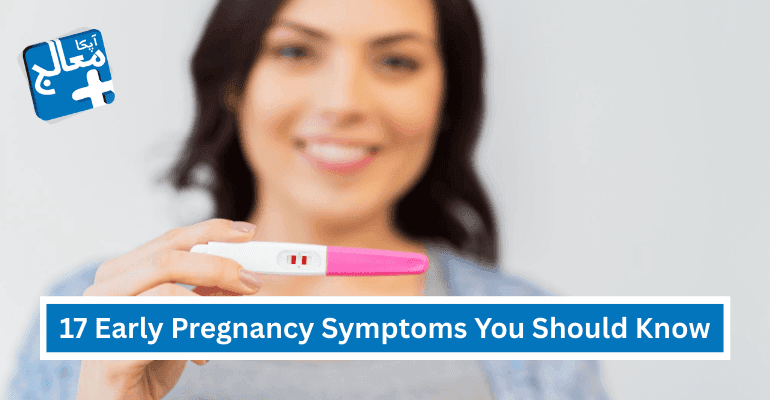Top 17 Strange Early Pregnancy Symptoms You Should Know

Pregnancy is a beautiful journey, starting from conceiving a baby to the delivery of the baby. It is ordinary to guess pregnancy by noticing common signs like tender breasts, morning sickness, and tiredness. However, some strange pregnancy symptoms are going to blow your mind as nobody talks about them, not even those celebrities with baby bumps sitting on those morning shows. According to Dr. Aisha Rehman, today you will discover these strange early pregnancy symptoms that you have been missing. If you feel any of the following symptoms, contact Apka Muaalij for the best medical care. Let's start our topic.
What Are the Symptoms of Pregnancy?
First of all, we all know that the pregnancy symptoms, in Urdu "حمل کی علامات", vary from woman to woman, but common signs and symptoms are nausea, vomiting, bloating, back pain, and missed periods. These are mostly linked to hormonal changes in the body, such as human chorionic gonadotropin (hCG), progesterone, and estrogen levels starting to increase. These changes can lead to weird pregnancy symptoms as well.
Also read: "11 Surprising Dry Apricot Benefits for Male Sexuality"
17 Strange Early Pregnancy Symptoms to Look Out for
1. Excessive Salivation
During the first trimester of pregnancy, the secretion of saliva increases, which is known as ptyalism. The women need to spit it out, usually on tissues, many times during the day, and the bad taste of saliva causes a condition of nausea and vomiting. Increased progesterone levels cause this condition in women during pregnancy. However, it typically resolves after the first trimester, which makes the remainder of the pregnancy journey more manageable.
2. Metallic Taste
One of the strange pregnancy symptoms is developing a metallic taste in the mouth, which is usually called “dysgeusia.” Hormonal changes in the body are the cause of this weird symptom, such as increased levels of estrogen. The good news is that it doesn't last long and fades away on its own, like other symptoms. However, it is sometimes so strong that women can't stand it. Changing dietary habits and consulting with a gynecologist can be a good solution.
3. Food Cravings and Abhorrence
Pregnant women, especially at the end of the first trimester and the start of the second trimester, develop strong cravings for certain foods such as pickles or ice cream. They may also go off taste for certain foods or smells, such as drinks with caffeine and meat, as stated by WebMD. It is usually caused by hormonal changes that develop such cravings and aversions.
4. Sensitivity to Smells
A heightened sense of smell, also known as hyperosmia, is common in pregnant women. These changes in the sense of smell happen in the first few months of pregnancy. According to WebMD, such strong smells of perfumes and cleaning products can cause nauseating feelings and food aversions.
5. Nasal Congestion and Frequent Sneezing
Sneezing or nasal congestion increases during the first trimester, especially the first six weeks or longer, which is called "pregnancy rhinitis.” Nasal passages are full of mucous membranes, and the blood flow to mucous membranes increases during pregnancy, which causes extra mucus and watery discharge, leading to congestion and frequent sneezing.
6. Darkening of the Areolas
The skin around your nipples and areolas gets darker and larger during pregnancy due to hormonal changes, especially estrogen and progesterone, which cause an increase in the production of pigments. According to Temeka Zore, MD, an ob-gyn and reproductive endocrinologist, the darkening of nipples could help a baby recognize the nipples for breastfeeding.
7. Mood Swings
You might know mood swings as a very common sign of pregnancy, but you will be amazed to know that these are caused by multiple reasons: physical stress, changes in your metabolism, hormonal changes, and fatigue. Women feel euphoric at one moment, and the next moment, they are emotional and teary. Mood swings are strong in the first trimester, but then again, there are mood changes in the third trimester.
8. Increased Vaginal Discharge
You might notice an increase in vaginal discharge during pregnancy; this is because your body keeps sweeping germs to avoid infections. At the end of the pregnancy days, it further increases, and this clear and sticky pink mucus comes away.
9. Skin Changes
During pregnancy, blood flow increases and oil production as well, which results in an overall glow known as the “pregnancy glow.” However, it can sometimes shift to another extreme case, which is acne, just as if you were a pimply teen. It is not a big deal, as keeping the skin clean and oil-free can help avoid acne.
10. Elevated Heart Rate
It is common to notice palpitations or elevated heart rates as the blood volume increases during pregnancy, and the heart needs to put more effort into circulating this blood in the body and supplying it to the fetus. It is important for the growth of the baby during development. These palpitations normally fade out after the delivery of the baby.
Also Read: Is Postpartum Depression Real & How to Avoid It?
11. Excessive Sweating
Some people experience an increase in sweating at some points of pregnancy, especially during the third trimester; this elevated sweating is called hot flashes and is due to hormonal changes. Pregnant women feel hot during this condition, but safe enough not to harm the baby. Some women might notice this strange pregnancy symptom, maybe later on, after the delivery.
12. Constipation
Pregnant women face gastrointestinal issues like constipation starting from the first trimester throughout pregnancy. As the baby grows, the pressure on the uterus and lower parts of the intestines increases along with an increase in progesterone, leading to slow bowel movements and an inability to empty the bowel.
13. Frequent Urination
You are living a normal life, and suddenly, your trips to the bathroom increase; this strange pregnancy symptom is due to an increase in blood volume, and the pressure on the bladder by the uterus increases. As the baby grows and falls into the pelvis, it also causes more frequent urination.
14. Leg Cramps
Some pregnant women feel aches in the areas of their legs, such as the calf muscles or thighs. Leg cramps occur in the second or third trimesters and are more frequent at night. The exact reason for leg cramps is unknown; however, it could be due to a vitamin deficiency, low levels of calcium, or weight gain during pregnancy. Long sitting also leads to pain in the legs.
15. Hyperpigmentation
The darkening of the skin in uncommon patterns, especially a line along the middle of the belly called linea nigra, melasma, or medial thighs, falls under hyperpigmentation and can be due to hormonal changes such as hyperthyroidism. There is nothing to worry about, as this is harmless.
16. Backaches and Joint Pain
You will feel pain in your back and joints as the body releases a hormone called relaxin, which relaxes ligaments as the body prepares itself for labor, leading to strain on joints and the pelvis. This is more common in the first trimester.
17. Unusual Sleep Patterns
Pregnant women also face sleep pattern issues in the form of primary insomnia, which causes the inability to sleep or awaken at night or early in the morning. It is multifactorial, such as discomfort, frequent urination, contractions, joint pain, back pain, hot flashes, and mental causes such as stress and depression. It can also lead to gestational diabetes. It is more common in the first trimester and later stages of pregnancy.
When Do Early Pregnancy Symptoms Start?
Pregnancy symptoms start to appear in the first few weeks and become more prominent in the second month. If you are trying to conceive a baby, you will be able to notice some common signs within a week or two of the missed period. It is important to notice that not all women face the same pregnancy symptoms or with the same intensity.
Also read: "17 Incredible Benefits of Jamun (Java Plum) for Health & Wellness"
In the End
Every pregnant woman has a different experience, and it takes time to get used to such strange signs and symptoms. Whether it is a metallic taste or hot flashes, knowing about these symptoms beforehand can prepare you mentally, as there will be no surprises, and you will be able to get through the initial phase with more confidence. There is nothing as “silly” when you are pregnant, so if you notice any of the usual and unusual signs, it is essential to consult an expert gynecologist in Pakistan through Apka Muaalij telehealth platform for a healthy pregnancy journey. Call 0423-2377001 to book an appointment with top online doctors for consultation today.
Frequently Asked Questions (FAQs)
What are the Pregnancy Symptoms in Urdu?
حمل کی علامات عورت سے عورت میں مختلف ہو سکتی ہیں، لیکن عام علامات میں متلی، قے، پیٹ میں گیس، کمر درد، اور حیض کا رک جانا شامل ہیں۔ یہ علامات عموماً جسم میں ہارمونی تبدیلیوں کی وجہ سے ہوتی ہیں، جیسے کہ ہومن کوریونک گوناڈوٹراؤپِن (hCG)، پروجیسٹرون، اور ایسٹروجن کی سطحوں کا بڑھنا۔ یہ تبدیلیاں بعض اوقات غیر معمولی یا عجیب حمل کی علامات کا سبب بھی بن سکتی ہیں۔
When do early pregnancy symptoms appear?
The pregnancy symptoms appear within a week or two of missed periods. The signs become prominent in the second month of pregnancy.
What are the first-month symptoms of pregnancy?
You will notice very common symptoms in the first month of pregnancy, such as nausea, vomiting, and mild cramps.
How many days before a period do pregnancy symptoms start?
Pregnancy symptoms might start to appear 6-10 days before a missed period. However, the clear signals are after a week or two of missed periods.
After how many days do pregnancy symptoms start to show?
Pregnancy symptoms start to show after 6-10 days of conceiving a baby.
What are the early pregnancy symptoms before a missed period?
You will notice early pregnancy symptoms before a missed period, such as bloating, cramps, nausea, and vomiting.
What are the 1-week pregnancy symptoms?
Pregnancy symptoms after one week are tender breasts, fatigue, nausea, and missed periods.

Dr. Bisma Shehzadi
Dr. Bisma Shehzadi, Pharm.D, RPh, is working as a professional seasoned content writer with 4 years of experience in healthcare and wellness writing. With a strong pharmaceutical background and clinical knowledge, she creates research-driven, search-optimized articles that simplify complex medical topics. Her writing enables her to craft content that educates, promotes wellness, and supports healthcare initiatives among online users and readers.